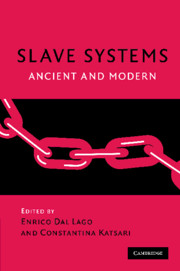Book contents
- Frontmatter
- Contents
- List of figures
- List of tables
- List of contributors
- Acknowledgments
- Part I SLAVERY, SLAVE SYSTEMS, WORLD HISTORY, AND COMPARATIVE HISTORY
- Part II ECONOMICS AND TECHNOLOGY OF ANCIENT AND MODERN SLAVE SYSTEMS
- Part III IDEOLOGIES AND PRACTICES OF MANAGEMENT IN ANCIENT AND MODERN SLAVERY
- Chapter 7 Ideal models of slave management in the Roman world and in the ante-bellum American South
- Chapter 8 Panis, disciplina, et opus servo: the Jesuit ideology in Portuguese America and Greco-Roman ideas of slavery
- Part IV EXITING SLAVE SYSTEMS
- Part V SLAVERY AND UNFREE LABOUR, ANCIENT AND MODERN
- Bibliography
- Index
Chapter 8 - Panis, disciplina, et opus servo: the Jesuit ideology in Portuguese America and Greco-Roman ideas of slavery
from Part III - IDEOLOGIES AND PRACTICES OF MANAGEMENT IN ANCIENT AND MODERN SLAVERY
Published online by Cambridge University Press: 22 September 2009
- Frontmatter
- Contents
- List of figures
- List of tables
- List of contributors
- Acknowledgments
- Part I SLAVERY, SLAVE SYSTEMS, WORLD HISTORY, AND COMPARATIVE HISTORY
- Part II ECONOMICS AND TECHNOLOGY OF ANCIENT AND MODERN SLAVE SYSTEMS
- Part III IDEOLOGIES AND PRACTICES OF MANAGEMENT IN ANCIENT AND MODERN SLAVERY
- Chapter 7 Ideal models of slave management in the Roman world and in the ante-bellum American South
- Chapter 8 Panis, disciplina, et opus servo: the Jesuit ideology in Portuguese America and Greco-Roman ideas of slavery
- Part IV EXITING SLAVE SYSTEMS
- Part V SLAVERY AND UNFREE LABOUR, ANCIENT AND MODERN
- Bibliography
- Index
Summary
INTRODUCTION
By the end of the fifteenth century, when medieval manuscripts containing works of Greek and Roman writers began to be rediscovered and read, their study led to comparisons between past and present, sometimes with a clear and positive preference for the former. In the European Renaissance, Greco-Roman culture was taken as an example of perfection, an idea that would endure unshaken until at least the eighteenth century. For example, in modern political theory, historians such as Sallust, Tacitus, and Livy, and philosophers such as Aristotle and Plato, were mentioned as sources of precepts for political action and for the analysis of state systems. In the making of modern economic thought, a similar process took place. The Latin agronomists – Cato, Varro, and Columella – were read as if their works formed a single unit, a model of agricultural writing in western Europe and in its colonial universe. The same could be said about the other surviving treatises on household management: the Oeconomicus of Xenophon and the Oeconomica of Pseudo-Aristotle.
Historians of the colonial world have already pointed out the presence of Greco-Roman ideas of slavery in the ideology of the master classes in the Americas. There are also studies on the influence of Roman legal sources on slave colonial legislation. However, it is not simply a matter of showing that the ancient culture supplied an intellectual framework for the understanding of modern slavery. The subject is more complex than is conventionally presumed.
- Type
- Chapter
- Information
- Slave SystemsAncient and Modern, pp. 214 - 230Publisher: Cambridge University PressPrint publication year: 2008
- 3
- Cited by



